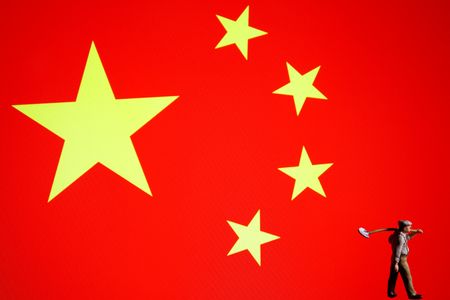By Siyi Liu and Dominique Patton
BEIJING (Reuters) – This Dec. 21 story has been corrected to clarify that the ban was on the export of technology to make rare earth magnets and that the ban on technology to extract and separate critical materials was already in place, in paragraphs 1 and 6. It also removes context and the comment on rare earth processing operations, in paragraphs 3 and paragraphs 18-20.
China, the world’s top processor of rare earths, banned the export of technology to make rare earth magnets on Thursday, adding it to a ban already in place on technology to extract and separate the critical materials.
Rare earths are a group of 17 metals used to make magnets that turn power into motion for use in electric vehicles, wind turbines and electronics.
“This should be a clarion call that dependence on China in any part of the value chain is not sustainable,” said Nathan Picarsic, co-founder of the geopolitical consulting firm Horizon Advisory.
China’s commerce ministry sought public opinion last December on the potential move to add the technology to prepare smarium-cobalt magnets, neodymium-iron-boron magnets and cerium magnets to its “Catalogue of Technologies Prohibited and Restricted from Export.”
In the list it also banned technology to make rare-earth calcium oxyborate and production technology for rare earth metals, adding them to a previous ban on production of rare earth alloy materials.
The catalogue’s stated aims include protecting national security and public interest.
China has significantly tightened rules guiding exports of several metals this year, in an escalating battle with the West over control of critical minerals.
It introduced export permits for chipmaking materials gallium and germanium in August, followed by similar requirements for several types of graphite since Dec. 1.
“China is driven to maintain its market dominance,” said Don Swartz, CEO of American Rare Earths, which is developing a rare earths mine and processing facility in Wyoming. “This is now a race.”
WEST STRUGGLES
The move to protect its rare earth technology comes as Europe and the United States scramble to wean themselves off rare earths from China, which accounts for nearly 90% of global refined output.
China has mastered the solvent extraction process to refine the strategic minerals, which MP Materials and other Western rare earth companies have struggled to deploy due to technical complexities and pollution concerns.
Shares of MP, which has slowly begun increasing rare earths processing in California, jumped more than 10% on Thursday after China’s move. The company did not immediately respond to requests for comment.
Ucore Rare Metals said on Thursday that it had finished commissioning of a facility to test its own rare earths processing technology, which is being funded in part by the U.S. Department of Defense.
“New technologies will be needed to outmaneuver the Chinese grip on these important areas,” said Ucore CEO Pat Ryan. Ucore’s stock rose more than 16%.
It is not clear to what extent China’s rare earths technology is actually being exported. Beijing has discouraged its export for years, said Constantine Karayannopoulos, former CEO of Neo Performance Materials, which separates rare earths in Estonia.
“This announcement just formalises what everyone knew to be the case,” Karayannopoulos said.
(Reporting by Siyi Liu, Dominique Patton and Beijing newsroom; additional reporting by Eric Onstad in London and Ernest Scheyder in Houston; editing by Toby Chopra, Jason Neely, Kirsten Donovan, Tomasz Janowski and Jonathan Oatis)

